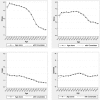A snapshot of the age distribution of psychological well-being in the United States
- PMID: 20479218
- PMCID: PMC2890490
- DOI: 10.1073/pnas.1003744107
A snapshot of the age distribution of psychological well-being in the United States
Abstract
Psychological well-being (WB) includes a person's overall appraisal of his or her life (Global WB) and affective state (Hedonic WB), and it is considered a key aspect of the health of individuals and groups. Several cross-sectional studies have documented a relation between Global WB and age. Little is known, however, about the age distribution of Hedonic WB. It may yield a different view of aging because it is less influenced by the cognitive reconstruction inherent in Global WB measures and because it includes both positive and negative components of WB. In this study we report on both Global and Hedonic WB assessed in a 2008 telephone survey of 340,847 people in the United States. Consistent with prior studies, Global WB and positive Hedonic WB generally had U-shaped age profiles showing increased WB after the age of 50 years. However, negative Hedonic WB variables showed distinctly different and stronger patterns: Stress and Anger steeply declined from the early 20s, Worry was elevated through middle age and then declined, and Sadness was essentially flat. Unlike a prior study, men and women had very similar age profiles of WB. Several measures that could plausibly covary with the age-WB association (e.g., having children at home) did not alter the age-WB patterns. Global and Hedonic WB measures appear to index different aspects of WB over the lifespan, and the postmidlife increase in WB, especially in Hedonic WB, deserves continued exploration.
Conflict of interest statement
Conflict of interest statement: A.D. and A.A.S. are Senior Scientists with the Gallup Organization, and A.A.S. is a Senior Consultant with invivodata, Inc.
Figures






References
-
- Kahneman D, Krueger AB, Schkade D, Schwarz N, Stone AA. Toward national well-being accounts. Am Econ Rev. 2004;94:429–434.
-
- Diener E, Kesebir P, Lucas R. Benefits of accounts of well-being—For societies and for psychological science. Appl Psychol Int Rev. 2008;57:37–53.
-
- Oswald AJ, Hu S. Objective confirmation of subjective measures of human well-being: Evidence from the U.S.A. Science. 2010;327:576–579. - PubMed
-
- Kahneman D, Diener E, Schwarz N. Well-Being: The Foundations of Hedonic Psychology. New York: Russell Sage Foundation; 1999.
-
- Blanchflower DG, Oswald AJ. Is well-being U-shaped over the life cycle? Soc Sci Med. 2008;66:1733–1749. - PubMed
Publication types
MeSH terms
Grants and funding
LinkOut - more resources
Full Text Sources
Medical

